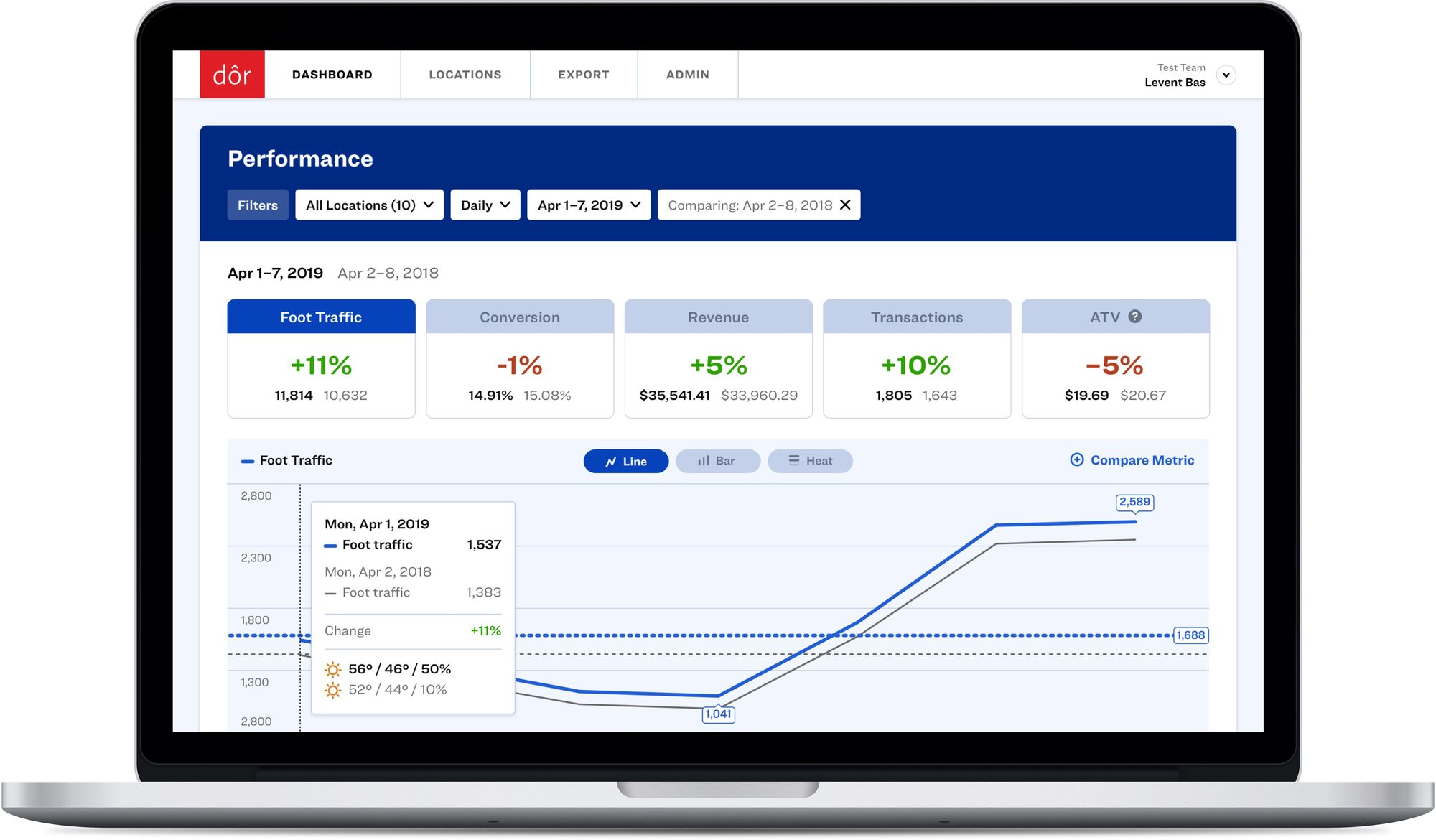Conventional wisdom indicates that every job has its own set of challenges, and the world of retail is no different.
Whether you’re new to the retail scene or you’re looking to improve your store management game in an ever-changing commercial climate, you’ll likely encounter challenges—but whether they turn out to be actual pitfalls or mere bumps in the road will depend largely on how well-prepared you are as a retailer.
If you want to avoid putting your retailer at risk, it’s a good idea to heed the advice of others who’ve crossed the same path. With that in mind, here are 25 must-know tricks of the trade, from staffing solutions to marketing best practices, to help you set up your retailer for success.

Did you know that a 1% increase in your store’s conversion rate can mean a 10% increase in revenue?
Click here to discover how Dor can help you understand your foot traffic data and make more profitable business decisions.
Ready to purchase? Complete your purchase in just minutes!
25 things no one told you about starting a retail business
1. Expect to get requests for freebies.
No matter how competitive your sales campaigns are, there will always be people looking to score a bigger deal.
Even if your customers don’t ask for freebies, in today’s social media-focused climate of influencers and even micro-influencers, you’re almost guaranteed to get at least a few requests for free merchandise in exchange for “exposure.”
Whether you choose to take people up on the offer or not depends on you, of course.
2. Don’t forget about charity donations.
Those new to the world of retail may not realize just how important it is to participate in events like local charity drives to boost the store’s reputation.
What’s more, depending on where your store is located, you may even get a tax deduction by donating gifts in kind. As such, it’s a good idea for new retailers to set aside a portion of their inventory for charity purposes.

3. Know that customers are bound to have different opinions.
Once you open your own retailer, you can expect to hear a wide array of different opinions from customers on how you can “improve” your store.
Not to worry, over time you will undoubtedly get better at differentiating valuable input from the rest.
4. Value customers’ spending habits over their comments.
To build on the point above, customers may say anything, but to gauge true consumer sentiment, it’s best to look at their spending habits as measured by KPIs and other metrics.
5. Forget about having weekends and holidays off.
No matter how much prior experience you may have as a retailer, opening your own store means forgoing weekend holidays and family vacations for at least the first year your business is in operation, as something will always come up at the last minute that requires your supervision.

6. Expect your store performance to vary from week to week.
When you first start to measure sales performance for your store, you may be surprised to discover that the metrics vary from week to week—sometimes you’ll have a great Saturday, while on other weeks Thursday will outperform every other day of the week.
7. Don’t alienate customers by discussing politics or religion.
This one is pretty self-explanatory—don’t get into politics or religion, whether in person or on your brand’s social media profiles.
8. Don’t expect perfection.
When it comes to having organized spaces, it’s best to accept, ahead of time, that areas such as stockrooms, breakrooms, or even the maintenance closet will almost never be organized 100% to your liking, so it’s better to focus on customer-facing spaces such as the showroom and your checkout area, instead.
Related: Physical Inventory Count in Retail: Benefits and Best Practices
9. Sales reps can mislead you, so do your own research.
When you’re in discussions with sales reps to get new inventory into your store, remember that their primary concern is to make a sale, so always do your own research to double-check whatever it is the sales rep is trying to sell you.
10. Trust the written word.
Oral contracts may have been the law of the land once upon a time, but nowadays, it’s best to opt for written contracts or agreements where you get things in writing as much as you can.
11. Be kind but firm with your vendors and suppliers.
If you’re a new player in retail, your vendors and suppliers may try to substitute other products or services to save costs.
However, if you let them substitute once, you may easily be stuck with inferior products or services from there on out. This is another place where having written contracts will protect you, as you will be armed with everything you need to insist that vendors and suppliers honor the agreed-upon deal.
12. Keep an eye on marketing firms.
If you decide to work with an outside marketing firm for your retailer, be sure to regularly ask for reports and routinely ask questions to gauge whether your marketing ROI (return on investment) is within an acceptable range.
Related: Digital Marketing for Retailers: Every Tactic and Channel You Must Know
13. Use foot traffic data to improve store layout.
Both new retailers and those looking to spruce up their store can utilize foot counter data to determine the busiest spots and revise the in-store layout accordingly.
Related: Dor People Counter | People Counting System & Technology
14. Train your employees.
When you start your own retailer, you’ll find that most customers can forgive shortcomings with your store, but they won’t forgive bad customer service.
That’s why training your staff to be courteous and offer your customers a top-notch experience is one of the most important tasks you’ll undertake as an employer.
Related: How to Talk to Walk-in Customers In Retail
15. Don’t rely on a good interview alone.
While we’re on the subject of staff, it’s a good idea not to get your hopes up just because a prospective employee did well during the interview.
Sometimes, you’ll find that a person’s performance during a structured interview can vastly differ from his or her demeanor under stressful situations with customers.
16. Be careful extending job offers to friends and family.
Birds of a feather may flock together, but that doesn’t mean every retailer will benefit from being a family-run business.
If you absolutely cannot avoid working with family or friends, try to make sure you are hiring people with whom you’ve had prior experience working under stressful conditions.
17. Keep in mind the 80-20 rule.
While this isn’t a foolproof formula, the general consensus is that many aspects of business follow an 80-20 rule—20% of customers may generate 80% of sales, for instance, or 20% of your shop floor may see 80% of foot traffic.
Whatever the case may be for your particular store, try to take note of such interesting patterns to inform future decisions about your retailer.
18. Don’t jump on generic management advice.
Even though it may be tempting to embrace every bit of wisdom you hear on the topic of management, it’s best to run such ideas—like the 80-20 rule, for instance—through your own filter to determine whether or not they apply to your retailer.
19. Don’t be afraid to change.
If you find you’re stuck in a certain aspect of your business, don’t be afraid to tweak whatever isn’t working—sometimes change is necessary, whether that’s for vendors, suppliers, store layout, or even your employees.
20. If you have more than a handful of employees, invest in a staff scheduling solution.
You won’t believe how much time you’ll save (and headache you’ll avoid) if by switching to a digital staff scheduling solution that also lets you distribute company-wide announcements in mere seconds.
21. Be flexible & have a sense of humor.
When you start a retail business, you should accept that anything that can go wrong will.
Whether you call it Murphy’s Law or by some other name, expect rain if you’re holding an outdoor event, or when you finally get a large shipment of your customers’ favorite product, don’t be surprised if their interest has already shifted to the next best thing.
22. Assume that customers don’t read the fine print.
Sometimes, it helps to treat customers as if they were children...
If someone is buying a gift at your store, be sure to remind them about your returns and exchange policy, or if you’re going to be closed for a certain day, be sure to have your staff verbally communicate that information in addition to providing signage throughout the store.
23. Switch up your marketing campaigns.
No matter how well-thought-out a specific marketing campaign may be, it’s a good idea to switch it up and try something new once in a while.
After all, it’s possible that certain campaigns won’t resonate with your audience—and you just may find that word-of-mouth does more for your small shop than promoting it on Facebook, or that an Instagram ad drives more traffic to your store than an in-store coupon in the newspaper.
24. Always practice patience with your customers.
As a retailer, you aren’t really allowed to have an “off” day. Always remain patient no matter how infuriating or disrespectful a customer may be and don’t forget that a single horrible customer experience can undo 99 great reviews in today’s online review-focused retail market.
Related: 14 Real-Life Examples of Amazing Customer Service in Retail
25. Know that the customer isn’t always right.
Last but certainly not least, customers don’t always have the final say in your store, contrary to popular belief.
If a customer is disrespecting your employees or your establishment or threatening other customers, it’s your job to defend your store and, if necessary, get the authorities involved.